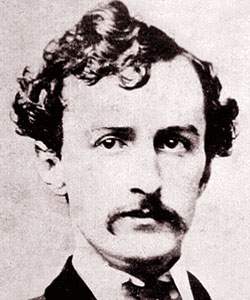John Wilkes Booth (American National Biography)
Scholarship
The kidnapping plot evaporated when the city of Richmond fell and the war ended. Five days later, on 14 April 1865, Booth learned that President Lincoln planned to attend Our American Cousin (starring Laura Keene) at Ford's Theatre. Working quickly, Booth assigned [George] Atzerodt to assassinate Vice President Andrew Johnson and [Lewis] Payne to kill Secretary of State William Seward while Booth himself murdered Lincoln. Atzerodt lost his nerve and made no attempt on Johnson, but Payne, a young giant, wounded Seward severely, as well as several others who tried to defend him.
Booth meanwhile had entered Ford's Theatre at about ten o'clock, moving across the rear of the balcony to the president's box. Waiting for the audience's laughter to cover the report of his derringer, Booth entered the box and fired a single .44-calibre bullet at point-blank range into the back of Lincoln's head. He shouted "Sic semper tyrannis! The South is avenged!" according to some, slashing with a dagger at Major Henry Rathbone, who tried to restrain him. Booth then leaped the twelve feet from the presidential box onto the stage, breaking his left leg. He escaped from the theater to a waiting horse, and, accompanied by [David] Herold, fled Washington. They stopped at the home of Dr. Samuel A. Mudd in Bryantown, Maryland, to have Booth's leg set, then hid in neighboring woods for six days while federal troops vainly searched for them.
Booth meanwhile had entered Ford's Theatre at about ten o'clock, moving across the rear of the balcony to the president's box. Waiting for the audience's laughter to cover the report of his derringer, Booth entered the box and fired a single .44-calibre bullet at point-blank range into the back of Lincoln's head. He shouted "Sic semper tyrannis! The South is avenged!" according to some, slashing with a dagger at Major Henry Rathbone, who tried to restrain him. Booth then leaped the twelve feet from the presidential box onto the stage, breaking his left leg. He escaped from the theater to a waiting horse, and, accompanied by [David] Herold, fled Washington. They stopped at the home of Dr. Samuel A. Mudd in Bryantown, Maryland, to have Booth's leg set, then hid in neighboring woods for six days while federal troops vainly searched for them.
Stephen M. Archer, "Booth, John Wilkes," American National Biography Online, February 2000, http://www.anb.org/articles/04/04-01210.html.
John Wilkes Booth (Goodrich, 2005)
Scholarship
Although [John] Wilkes [Booth] was an outspoken advocate of Southern rights, other siblings in the Booth family were either neutral or, as was the case with older brother Edwin, strongly pro-Union.
In 1859, when the startling news from Harpers Ferry arrived, John Booth was performing in Richmond. Begging officers to take him along, the actor joined a Virginia militia unit as it rushed north to quell the attempted slave revolt led by the abolitionist John Brown. Although diametrically opposed to Brown’s beliefs, Booth nevertheless came to understand and respect the grit and determination of the white-bearded Kansan. After his capture and trial, Booth was also present at Brown’s execution. More than his life, it was John Brown’s death that stirred the actor’s greatest admiration. The image of the “rugged old hero” standing alone on the scaffold unflinchingly, moments from eternity, without a friend or rescuer in sight, was one that Booth never forgot…One of the lessons Booth learned from Brown was that even in utter defeat, millions of souls might still be stirred; that one bold man with a will of iron and a heart of steel could make a difference and change the course of history. “John Brown was a man inspired, the grandest character of this century!,” praised Booth.
In 1859, when the startling news from Harpers Ferry arrived, John Booth was performing in Richmond. Begging officers to take him along, the actor joined a Virginia militia unit as it rushed north to quell the attempted slave revolt led by the abolitionist John Brown. Although diametrically opposed to Brown’s beliefs, Booth nevertheless came to understand and respect the grit and determination of the white-bearded Kansan. After his capture and trial, Booth was also present at Brown’s execution. More than his life, it was John Brown’s death that stirred the actor’s greatest admiration. The image of the “rugged old hero” standing alone on the scaffold unflinchingly, moments from eternity, without a friend or rescuer in sight, was one that Booth never forgot…One of the lessons Booth learned from Brown was that even in utter defeat, millions of souls might still be stirred; that one bold man with a will of iron and a heart of steel could make a difference and change the course of history. “John Brown was a man inspired, the grandest character of this century!,” praised Booth.
Thomas Goodrich, The Darkest Dawn: Lincoln, Booth, and the Great American Tragedy (Bloomington: Indiana University Press, 2005), 60-61.







